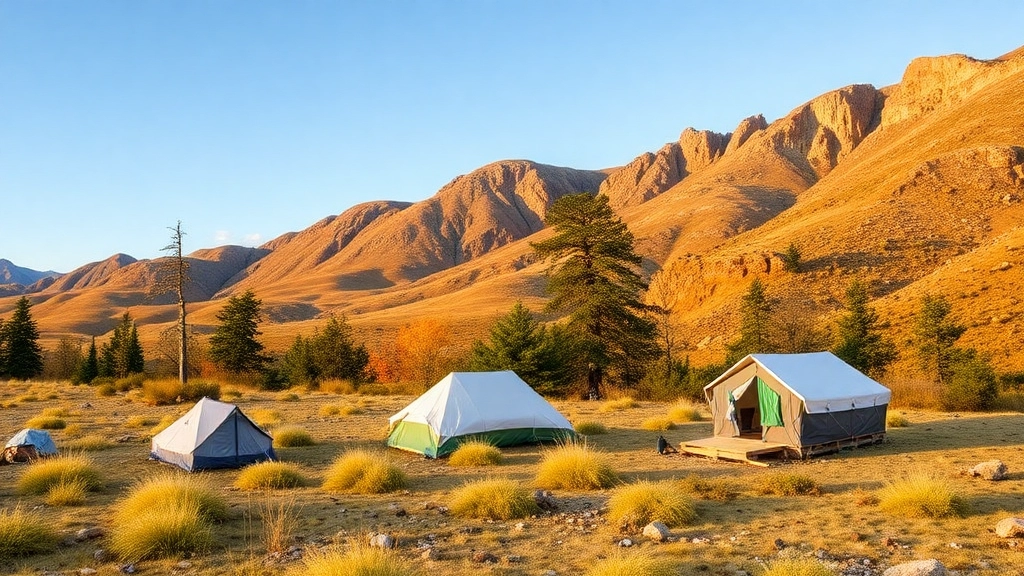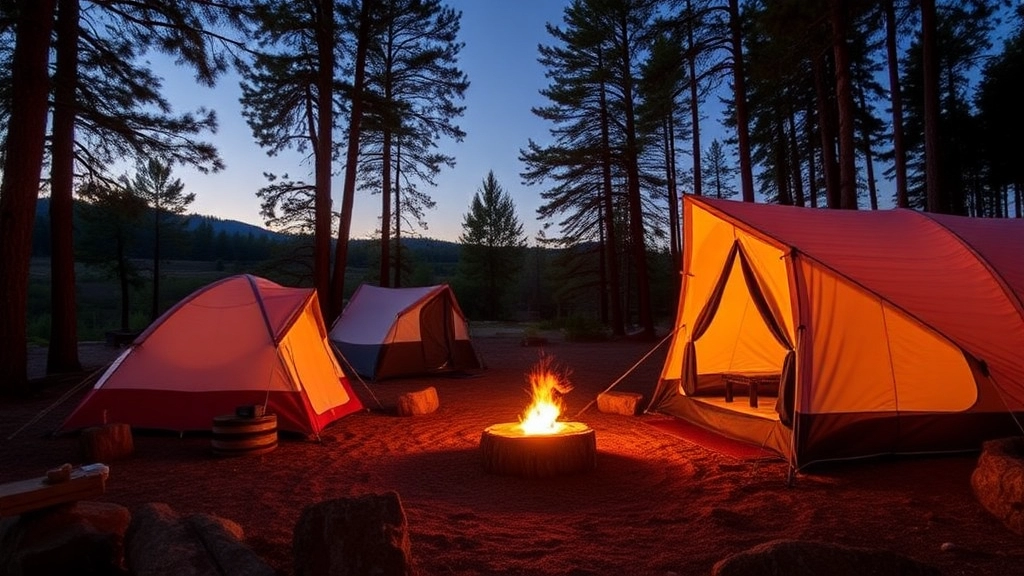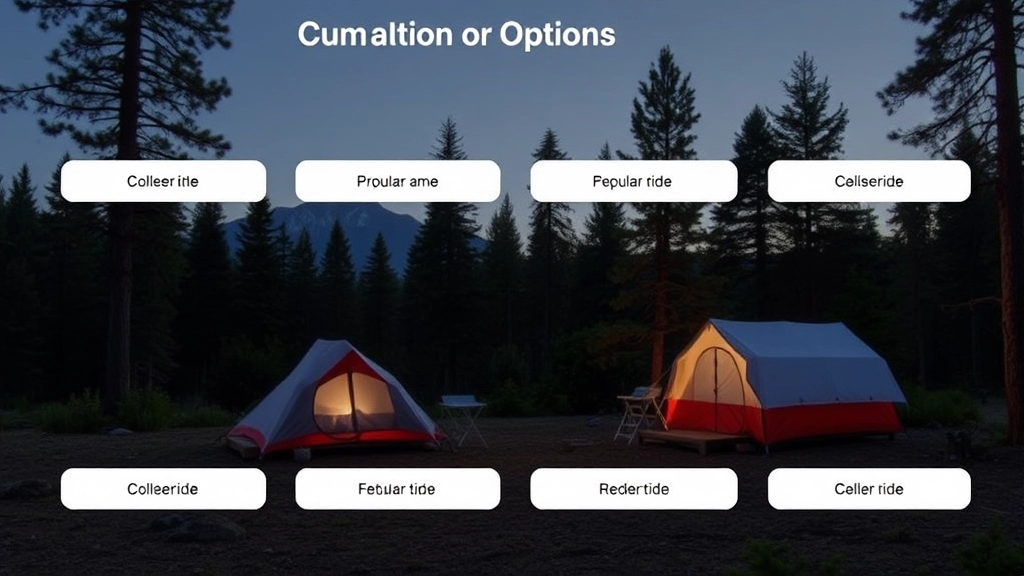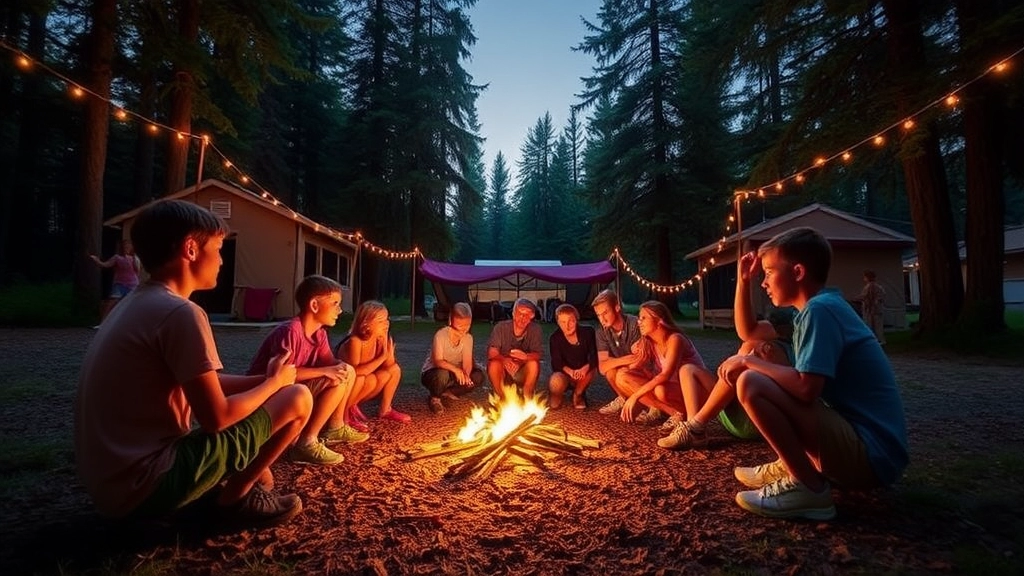Wondering “How Long Does Summer Camp Last?”
You’re not alone. As a parent, choosing the right camp duration for your child can be a daunting task. This article dives into the typical durations of summer camps, the variations in camp lengths, and the factors influencing these durations. Whether you’re considering a short-term camp for a first-timer or a long-term camp for a seasoned camper, we’ve got you covered.
We’ll explore the benefits of different camp lengths, how to choose the right duration for your child, and popular camp duration options. Additionally, we’ll provide tips on planning for different camp lengths, parental considerations, and the impact of camp duration on child development. By the end of this guide, you’ll have all the information you need to make an informed decision and ensure a memorable summer camp experience for your child.
Variations in Camp Length

Ever wondered how long a summer camp should be?
You’re not alone.
Parents are often puzzled by the different camp lengths available.
So, let’s break it down.
Short-Term Camps
Short-term camps usually last a few days to a week.
Perfect for first-timers or kids who might get homesick.
They offer a quick burst of fun and activities without a long-term commitment.
Medium-Term Camps
These camps typically run for two to four weeks.
A great option for kids who are a bit more comfortable being away from home.
They get a taste of independence while still having a set return date.
Long-Term Camps
Long-term camps can last up to eight weeks or more.
Ideal for older kids or those who’ve been to camp before.
They offer a deeper experience and stronger friendships but can be a stretch for some families.
Specialised Camps
Some camps are designed around specific activities or skills and might have unique durations.
For example:
- Sports camps could be a week-long intensive.
- Academic camps might run for the entire summer.
- Adventure camps could vary depending on the activities planned.
Why So Many Options?
Different families have different needs.
Some parents need a break, while others want their kids to gain new skills.
And let’s be real, some kids just can’t handle being away from home for too long.
How to Choose the Right Length
Think about your child’s personality and needs.
- First-time camper? Start with a short-term camp.
- Comfortable being away? Try a medium-term camp.
- Experienced camper? Go for a long-term camp.
Real-Life Example
My mate Sarah sent her daughter to a one-week camp last summer.
By day three, her daughter was begging to stay longer.
This year, she’s signed up for the full four weeks.
Factors Influencing Camp Duration
Ever wondered why some summer camps are just a week long while others stretch out for a whole month? You’re not alone. The duration of summer camps can vary widely, and a lot goes into deciding how long a camp should last. Let’s break it down.
Key Factors Influencing Camp Duration
- Age of the Campers
- Younger Kids (5-10 years): Shorter camps, typically 1-2 weeks, are ideal. At this age, kids might get homesick easily and shorter camps help them adjust without overwhelming them.
- Older Kids and Teens (11-17 years): They can handle longer durations, often up to 4-8 weeks. These longer camps offer more in-depth experiences and skill-building opportunities.
- Camp Type and Focus
- Day Camps vs. Overnight Camps: Day camps are usually shorter in duration, ranging from a few days to a couple of weeks, because kids return home each evening. Overnight camps can be longer, offering a more immersive experience.
- Specialised Camps: Camps focusing on specific skills like coding, sports, or arts may have varied lengths depending on the depth of the curriculum. A coding bootcamp might be just a week, while a sports camp could last a month.
- Camp Goals and Activities
- Skill Development: Camps aimed at teaching new skills or improving existing ones might need more time. Think about how long it takes to learn a new language or master a musical instrument.
- Recreational Focus: Camps prioritising fun and social activities might be shorter since the goal is to give kids a break and a taste of something new without a long-term commitment.
- Parental Preferences and Schedules
- Work Schedules: Parents’ availability and work commitments play a huge role. Some parents might prefer shorter camps that fit into their holiday schedules, while others might need longer camps to cover the entire summer break.
- Financial Considerations: Longer camps can be more expensive. Parents need to balance the cost with the benefits to decide what works best for their family.
- Location and Accessibility
- Local vs. Out-of-Town Camps: Camps that are close to home might be shorter since kids can easily return home if needed. Out-of-town or international camps often have longer durations to justify the travel and provide a fuller experience.
- Feedback and Tradition
- Past Experiences: Camps often adjust their lengths based on feedback from previous years. If a two-week camp was a hit, they might stick with it. If parents and kids wanted more time, they might extend it.
- Historical Trends: Some camps have been running for decades and have traditional lengths that they stick to, based on what’s worked historically.
Real Talk: Stories and Examples
A friend of mine sent her 8-year-old to a one-week day camp last summer. It was the perfect introduction to summer camps for both the kid and the parents. No homesickness, just a lot of fun and learning. On the other hand, another mate’s teenager went to a four-week wilderness camp. It was intense but transformative. The kid came back with new skills, confidence, and a bunch of new friends.
Quick Tips for Parents
- Assess Your Child’s Readiness: Is your child ready for a longer camp, or would they benefit more from a shorter, more focused experience?
- Consider Your Schedule and Budget: Balance your work commitments and financial situation with the camp’s duration.
- Talk to Other Parents: Get recommendations and insights from parents who’ve been there, done that.
Benefits of Different Camp Lengths

Ever wondered what the ideal summer camp length is for your child?
Yeah, me too.
Let’s dive into the benefits of different camp lengths and help you figure out what’s best for your kid.
Short Camps (1-2 Weeks)
Short camps are like a quick dip in the pool. They’re perfect for first-timers or younger kids.
Benefits:
- Eases Separation Anxiety: Short stays make it easier for kids (and parents) to adjust.
- Taste Test: Gives kids a taste of camp life without long-term commitment.
- Flexible Scheduling: Easier to fit into busy summer schedules.
Medium Camps (3-4 Weeks)
Medium-length camps offer a bit more. It’s like moving from a kiddie pool to the shallow end.
Benefits:
- Skill Development: More time to learn and practice new skills.
- Deeper Friendships: Kids have more time to bond and make lasting friendships.
- Routine Building: Enough time to establish a routine and get comfortable.
Long Camps (5+ Weeks)
Now we’re talking deep end of the pool. Long camps are the full immersion experience.
Benefits:
- Independence: Kids become more self-reliant and independent.
- In-Depth Learning: Mastery of skills and activities.
- Stronger Bonds: Lifelong friendships and stronger social skills.
Why It Matters
Choosing the right camp length can make or break your child’s summer experience. It’s not just about keeping them busy. It’s about growth, fun, and memories.
Real Talk
I remember sending my nephew to a two-week camp. He came back more confident and independent. But when he went for a month the next year? Whole new level. He learned to sail, made friends from different countries, and didn’t want to come home.
What’s Right for Your Child?
Consider these factors:
- Age: Younger kids may do better with shorter camps.
- Experience: First-timers might prefer shorter stays.
- Interests: Older kids with specific interests might benefit from longer camps.
FAQs About Camp Duration
Got more questions? Check out our FAQ section for answers to common queries about camp lengths. Trust me, finding the right camp duration can make all the difference.
Sure, here’s the text content formatted with internal links embedded naturally, following the sitemap data:
—
Are you looking for ideas to keep campers engaged and having fun? **Check out these** [top summer camp board games for all ages](https://summercamp.blog/top-summer-camp-board-games-for-all-ages/), perfect for campers to play during downtime.
Additionally, **planning exciting excursions** is key to a successful camp experience. **Don’t miss our guide** to [summer camp field trips, including top tips and destinations](https://summercamp.blog/summer-camp-field-trips-top-tips-and-destinations/), ensuring campers have an unforgettable experience.
—
Let me know if you need further adjustments or more links!
Popular Camp Duration Options

Ever wondered how long a summer camp should be?
It’s one of the top questions parents ask.
Let’s break it down.
One-Week Camps
Perfect for first-timers.
Why?
- Short and sweet: Just enough time to get a taste.
- Less homesickness: Easier for kids (and parents) to handle.
- Variety: Try out different camps without a big commitment.
Two-Week Camps
A step up from one-weekers.
What’s the deal?
- Deeper dive: More time to learn and bond.
- Skill-building: Enough time to pick up a new skill.
- Balanced: Not too short, not too long.
Four-Week Camps
Now we’re getting serious.
Here’s why they rock:
- Immersion: Kids get fully into the camp vibe.
- Strong friendships: More time means stronger bonds.
- Growth: Big leaps in personal development.
Full Summer Camps
The ultimate camp experience.
What’s the catch?
- Total immersion: Kids live and breathe camp life.
- Life skills: Independence, resilience, you name it.
- Deep connections: Lifelong friendships often form here.
Which one should you pick?
It depends on your kid.
Think about:
- Age: Younger kids might prefer shorter camps.
- Experience: Seasoned campers might crave a longer stay.
- Interests: Some activities need more time to master.
Quick Tips for Choosing:
- Talk to your child: Get their input.
- Check reviews: See what other parents say.
- Visit the camp: If possible, take a tour.
Popular Camp Duration Options offer something for everyone.
From one-week tasters to full summer adventures, there’s a perfect fit out there.
To create unforgettable summer experiences for children, it’s essential to incorporate a variety of engaging activities and themes. One of the most popular options is to explore **summer camp weekly themes for endless fun**, which can keep campers excited and looking forward to each new day. Additionally, organizing **fun summer camp crafts for kids** can be a fantastic way to stimulate creativity and provide a sense of accomplishment. These activities not only make the camp experience memorable but also contribute to the campers’ overall development and enjoyment.
Frequently Asked Questions About Camp Duration
How long should a summer camp be?
Great question! It’s one I get asked all the time.
The duration of a summer camp can vary, but the typical range is from one week to eight weeks.
What’s the best camp length for my child?
This depends on several factors:
- Age: Younger kids might do better with shorter camps.
- Experience: First-time campers might prefer a shorter stay.
- Interests: If your child is passionate about a particular activity, a longer camp might be more beneficial.
Are there camps that offer flexible durations?
Absolutely.
Many camps offer options that range from a few days to several weeks.
It’s all about finding what fits best for your family’s schedule and your child’s comfort level.
How do I know if my child is ready for a longer camp?
Here are a few signs:
- They’ve successfully stayed away from home before.
- They express interest in a longer camp experience.
- They can handle daily routines independently.
What if my child gets homesick?
Homesickness is normal.
Most camps have strategies in place to help kids cope, such as:
- Regular communication with parents.
- Supportive counsellors.
- Fun activities to keep them engaged.
Can I visit my child during camp?
This varies by camp.
Some camps have specific visiting days, while others might have stricter policies to help kids adjust independently.
What are the benefits of a longer camp?
Longer camps can offer:
- Deeper friendships: More time to bond with peers.
- Skill development: More time to master new activities.
- Independence: Greater opportunity for personal growth.
Is a shorter camp worth it?
Absolutely.
Shorter camps can still provide:
- A taste of camp life: Perfect for first-timers.
- Focused learning: Intense, short-term skill-building.
- Flexibility: Easier to fit into busy summer schedules.
How do I prepare my child for camp?
Here are some tips:
- Pack together: Make it a fun activity.
- Talk about expectations: Discuss what camp will be like.
- Practice independence: Encourage them to do small tasks on their own.
What if my child wants to leave early?
This can happen.
Most camps have protocols for early departures, but it’s important to:
- Communicate: Talk to camp staff about your child’s concerns.
- Assess the situation: Sometimes, a simple solution can make a big difference.
FAQs About Summer Camp Duration
How long does a typical summer camp last?
Summer camps can vary in length, typically ranging from a few days to eight weeks or more. The duration depends on the type of camp and the needs of the campers.
What are short-term camps?
Short-term camps usually last a few days to a week. They are perfect for first-time campers or children who may experience homesickness. These camps offer a quick burst of fun and activities without a long-term commitment.
How long are medium-term camps?
Medium-term camps typically run for two to four weeks. They are a great option for kids who are more comfortable being away from home and provide a good balance of independence and a set return date.
What defines a long-term camp?
Long-term camps can last up to eight weeks or more. They are ideal for older kids or those who have previous camp experience. These camps offer a deeper experience and the opportunity to form stronger friendships, but they can be a stretch for some families.
Are there specialized camps with unique durations?
Yes, some camps are designed around specific activities or skills and might have unique durations. For example:
- Sports camps could be a week-long intensive.
- Academic camps might run for the entire summer.
- Adventure camps could vary depending on the activities planned.
Why are there so many camp duration options?
Different families have different needs. Some parents may need a break, while others want their kids to gain new skills. Additionally, some children may not be able to handle being away from home for extended periods.
How can I choose the right camp length for my child?
Consider your child’s personality and needs. Here are some tips:
- First-time camper? Start with a short-term camp.
- Comfortable being away? Try a medium-term camp.
- Experienced camper? Go for a long-term camp.
What are the benefits of different camp lengths?
Each camp length has its own set of benefits:
- Short Camps (1-2 weeks): Eases separation anxiety, provides a taste of camp life, and offers flexible scheduling.
- Medium Camps (3-4 weeks): Allows for skill development, deeper friendships, and routine building.
- Long Camps (5+ weeks): Promotes independence, in-depth learning, and stronger social bonds.
Can you provide a real-life example of choosing a camp length?
Sure! My friend Sarah sent her daughter to a one-week camp last summer. By day three, her daughter was begging to stay longer. This year, she’s signed up for the full four weeks.
What factors should I consider when choosing a camp duration?
Consider these factors:
- Age: Younger kids may do better with shorter camps.
- Experience: First-timers might prefer shorter stays.
- Interests: Older kids with specific interests might benefit from longer camps.
Any quick tips for choosing the right camp length?
- Talk to your child: Get their input on what they feel comfortable with.
- Check reviews: See what other parents and campers say about the camp.
- Visit the camp: If possible, take a tour to get a feel for the environment.
Finding the right camp duration can make all the difference in your child’s summer experience. From one-week tasters to full summer adventures, there’s a perfect fit out there for everyone.
References
- How Long Should a Camp Session Be?
- How to Choose the Right Summer Camp for Your Child
- What to Consider When Choosing a Summer Camp

